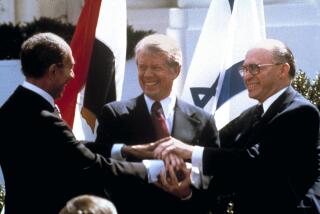A Desperate Hussein Plays the Iran Card : Accommodation with Tehran would be very bad news
- Share via
Peace may be about to break out in one part of the Persian Gulf, but it won’t be in Kuwait, where Iraq’s army shows every sign of digging in for a long period of occupation and plunder. Suddenly it looks as if Iraq may be near to settling its conflict with Iran, two years after a cease-fire halted their brutal war, 10 full years after Iraqi dictator Saddam Hussein launched what he thought would be a pushover campaign to humiliate an ancient foe and seize full control of the Shatt al Arab, the strategic waterway between the two countries.
What Hussein instead blundered into was a war of attrition that consumed 1 million Iraqi and Iranian lives and left Iraq with tens of billions of dollars in debts. But the war also left it with an army big enough to scare everyone in the neighborhood. The connection between that war and Hussein’s aggression against Kuwait is direct and clear-cut. Kuwait and Saudi Arabia heavily subsidized Iraq’s conflict with Iran. Hussein invaded Kuwait in good part to erase that debt, through the simple gangster tactic of eliminating his creditor.
Now, with the kind of utterly Machiavellian cynicism that entrenched tyrants tend to get away with, a desperate Hussein proposes to let bygones be bygones. The devastating sacrifices of his eight-year war with Iran are simply to be written off. Few if any in Iraq will have the courage to protest this capitulation.
Hussein says he will make peace on Tehran’s terms, in effect restoring the pre-1980 status quo. If this is achieved--and so far Iran is delightedly receptive to Hussein’s offer--Iraq will have pretty much secured its eastern flank and eliminated the possibility, however slim, of perhaps having to fight a two-front war.
At a minimum, Hussein should be able to thin out his forces along the 750-mile border with Iran, sending more troops to the south and--since Syria is also an ideological enemy--to defensive positions in western Iraq.
Though shamelessly opportunistic, this is also something of a strategic masterstroke. Hussein proposes to withdraw his forces from the few square miles of Iran they still occupy, to exchange war prisoners and to reinstate the 1975 agreement between the two countries to share control of the Shatt al Arab, Iraq’s outlet to the Persian Gulf. It was mainly to secure control over the Shatt’s eastern--Iranian--side that he went to war in 1980. If Iraq can hold on to Kuwait, its gulf shoreline will be greatly increased and the Shatt becomes secondary.
An Iran-Iraq accommodation could be bad news for international efforts to isolate Iraq and force it to disgorge Kuwait. Tehran, like Baghdad, wants U.S. and other Western military forces out of the gulf. Tehran, like Baghdad, despises the Saudi royal family and looks on the leaders of the gulf’s smaller sheikdoms with contempt.
If the two countries can even temporarily set aside their historic enmity--if like Hitler and Stalin in 1939, they can expediently make common cause--the embargo against Iraq might collapse, and along with it the great cooperative movement to roll back aggression.
It all depends on whether Iran lets itself become Iraq’s export-import lifeline. That possibility, virtually unbelievable just a few days ago, is now suddenly very real.
More to Read
Sign up for Essential California
The most important California stories and recommendations in your inbox every morning.
You may occasionally receive promotional content from the Los Angeles Times.










